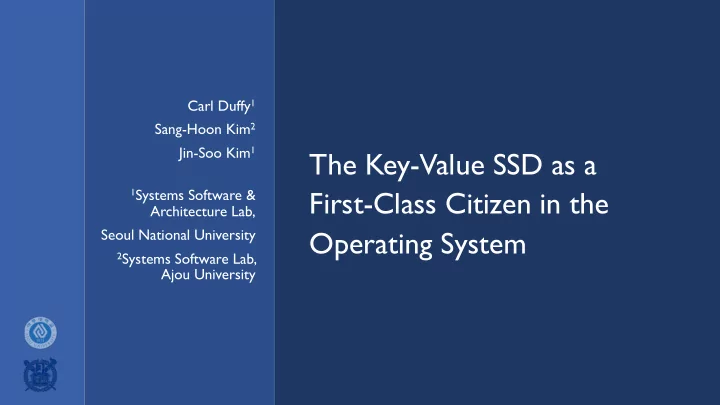

Carl Duffy 1 Sang-Hoon Kim 2 Jin-Soo Kim 1 The Key-Value SSD as a First-Class Citizen in the 1 Systems Software & Architecture Lab, Operating System Seoul National University 2 Systems Software Lab, Ajou University
§ Key-value stores running on block SSDs require several lookups from key to physical address KV Store SSD User Program File System ”userkey001” 00000001.sst 00065536 00001024 Lookup #1 Lookup #2 Lookup #3 (key to file) (file to LBA) (LBA to PPA) 2
§ Compaction is later required to remove stale data and reclaim logical space aaaa bcde cdcb cdef 00000005.sst 00000006.sst ergf lfre aaaa cdef aaab erfg 00000001.sst cdcb aaaa 00000002.sst aaaa bcde 00000003.sst lfre cdef 00000004.sst 3
SSD User Program § Key-value SSDs use keys to access files, not LBAs § Data management operations are handled inside the device ”userkey001” 00065536 § Less translation overheads, no compaction (or similar data management) Lookup #1 (key to PPA) 4
§ Key-value interface affords a leaner I/O stack § However, bypasses important OS layers • Cannot safely use KVSSDs in cloud and multi-user environments • No OS level page caching § Current system calls unsuitable for KVSSD I/O 5
§ First proposal : a thin pseudo file system designed for KVSSDs • Provide a special file for each unique key space (bucket) • open() these files for bucket level permissions and locking • Key-value tailored data cache inside the file system • Call familiar functions on buckets (ls, cat) 6
§ Second proposal : system calls for KVSSD I/O • Current Linux system calls unsuitable for key-value I/O • Perform I/O at the bucket level • put(), get(), delete(), batch(), iterate() • Larger value size support than allowed by device 7
cduffy@snu.ac.kr sanghoonkim@ajou.ac.kr jinsoo.kim@snu.ac.kr Thank You csl.snu.ac.kr sslab.ajou.ac.kr
Recommend
More recommend